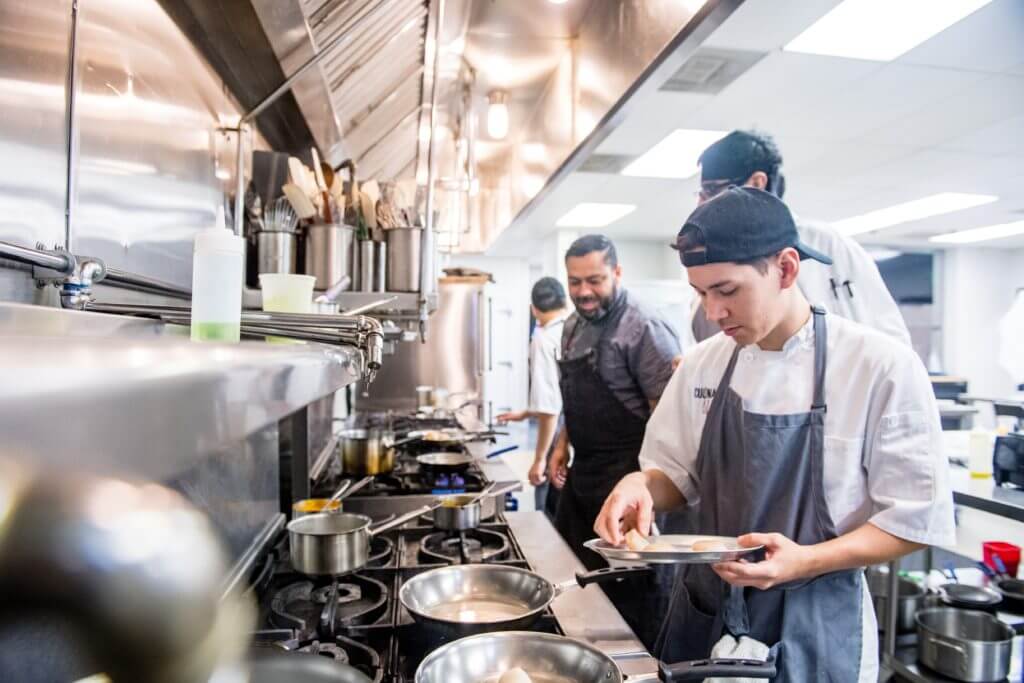How Many Hours Does A Chef Work?

When you’re starting out as a cook or a culinary student, one of the first things you may want to know is what sort of hours will be expected of you when you begin working in a professional kitchen.
How Many Hours Does a Cook Work?
How about a chef? What about an executive chef?
As a guide, the standard chef position demands 50-plus hours a week, including nights, weekends and holidays.
For a chef job in a restaurant, expect to work 7 days a week for 12 to 14 hours each shift.
And that’s pretty much the industry standard. No matter the level you are at in the kitchen, you can expect to work a minimum of 50 hours a week. But expect more.
In this report, we examine the work hours and reasons for the long hours of a cook, chef and executive chef, and compare it to other industries. I’ll also offer my own experiences as a first-year prep cook, fresh out of culinary school:
At A Glance: The Work Environment of a Chef
The work is sometimes brutal, standing over a hot stove, chopping vegetables or stocking shelves in a cold freezer. For executive chefs, the role requires hours of paperwork, budget planning, inventory and scheduling. And for them, the hours could get up into the 120s.
For someone new to the industry, you’re going to hear this repeated over and over. It’s not meant to scare off aspiring chefs, but as a reality check.
In my experience, as a new cook who has worked in three professional kitchens, cooks are typically scheduled for an eight-hour work day five or six days a week. And weekends are work days in most kitchens.
Many times, as kitchen needs arise, cooks are expected to stay later — until the job gets done. This may entail covering for a late or absent co-worker, finishing a recipe or task that you’re working on, dealing with an unexpected rush of diners at the end of your shift, waiting for the dining room to clear out or — most likely — you need to stay and clean up. More on this later.
So if you’re scheduled to work six eight-hour shifts, then work an additional overtime hour or two every night, you can see how you could approach 50 hours a week.
It’s tough work with long hours, but there is a silver lining. Kitchens are run by human beings who have families and personal lives, much like you do. They know burnout is common in the industry, so they will try to keep their cooks happy, when possible.
If you’re fortunate, as I have been, and work for a reasonable head chef who is willing to work with you and respect your needs, you can ask for time off. You can work around school, family events, and even a second job.
Many of the cooks I’ve worked with are students by day, and some have second jobs.
Cook jobs in Orange County pay around $12 to $16 an hour. With rents in the area averaging close to $2,000 a month, it’s easy to see why cooks work long hours, work two jobs, and seek as many overtime hours as possible.
This is fine when you’re young and your body is able to withstand the grind. But as you age, and you can’t work like you did in your 20s and 30s, the long hours can take a toll on your body.
In many kitchens, there is a role for part-time cooks.
You can choose to work fewer hours. But for those who need or want to make more money, and those who want to get better and climb the proverbial ladder, a 60-hour work week is the way to get there.
Salaried employees in California start out earning at least $50,000 a year, so a lot of cooks work to reach that level, says chef Jimmy Olang, corporate executive chef at 24 Carrots Catering and Events in Costa Mesa.
“When you move up and you get on that salary, your life is over,” he said. “That’s why I don’t know why everyone wants to move up. The more you move up, the more responsibility you have to take on and the more hours you have to work.”
Chef Vs. The Rest: An Industry Comparison
How does a chef’s work week compare with other industries?
As far as the hours go, a chef’s work week is similar to that of a lawyer, teacher, truck driver surgeon or a farmer. But either lower pay or physical labor sets it off from other professions.
Lawyers generally work 40 hours a week. They often spend a lot of additional hours conducting research and preparing documents. Lawyers are also paid much more than chefs.
Aside from classroom work, teachers spend additional hours grading papers and non school-related duties. While a teacher can grade papers from the comfort of his or her own couch, a chef doesn’t get such luxuries.
“The hours are pretty similar, but the job is very different,” says Chef Olang.
“We’re on our feet 10, 12, 14 hours a day. The environment we’re working in is not even close to that of a teacher or a lawyer.”
The job of a chef compares more with farmers and construction workers than it does with most white-collar industries.
Remember to Consider Time Spent Cleaning: It’s a Chef’s Responsibility
One of the things most aspiring chefs don’t realize is the amount of cleaning they will have to do. Cleaning takes time, and you need to factor this into your day as a chef.
If you’re working a late shift or scheduled to close the restaurant, as opposed to opening or a swing shift, the chances are much greater that you will stay later than what you are scheduled. Because closing often means a hectic dinner rush followed by a ton of cleaning.
Cleaning should be a top priority in a well run kitchen, says Chef Olang, “because sanitation is of utmost importance. If you walk into a kitchen that looks like it hasn’t been cleaned, it means the food isn’t very clean.”
From top to bottom, most kitchens are cleaned every night. And in my experience, the cooks do 75 percent to 100 percent of the cleaning themselves.
Even if your kitchen has a dishwasher on staff or a cleaning crew, the cooks will spend a major part of their workday cleaning. In a normal day, cooks clean cutting boards, counters, floors, walls, ranges, flattops, kitchen appliances, range hoods, knives, utensils, and yes, pots, pans, dishes, and more.
Generally, you go home when the kitchen is clean, not when your timecard says your time is up.
In some kitchens, how well and how quickly you clean the kitchen is about as important as how well you can cook. Executive chefs take this part of the job very seriously.
If you clean quickly and thoroughly, you can spend more time cooking, and you can go home earlier, therefore saving money for the company.
The point is this: in an eight-hour work day, not all of it will be spent cooking over a hot stove or chopping onions. Get good at cleaning and you can cut back on your hours.
The Real Story on Working Hours: Straight from the Chef’s Mouth
“I’ve gone anywhere from 120 hours to 50 to 60,” says Chef Olang, corporate executive chef at 24 Carrots Catering and Events in Costa Mesa. “On a regular basis, I’m working 60 hours. When we’re really busy, it gets up to 120. A lot of people out there are doing 120.”
“In the beginning, 80 to 100 hours was the norm,” says Jo-jo Doyle, executive chef and director of operations at the Honda Center in Anaheim. Now in his 40s, Doyle says he still works 50-60 hours a week. As he advanced in the industry, his responsibilities changed, but the time he spends on the job is still much more than a normal 40-hour work week.
The harsh reality, according to Chef Doyle, is that if you want to A) make money, and B) advance in the industry, you will need to put in the time.
Author Bio
After 30 years in the newspaper industry, Orange County native Joe Ardent decided to put down the press pass in favor of a chef coat. Joe was a reporter, editor and page designer at the Orange County Register and The Press-Enterprise in Riverside, CA. He interviewed professional athletes, rock stars, comedians and others during the 1990s and 2000s. In 2018, he set out to pursue his dream in the food industry.










